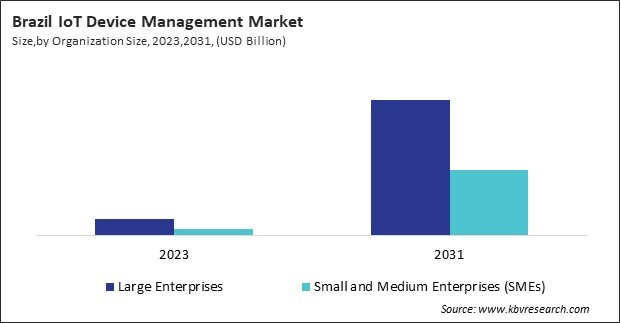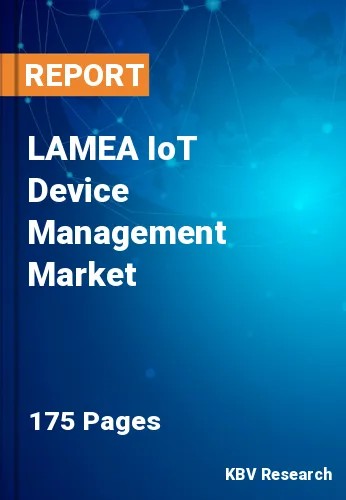The Latin America, Middle East and Africa IoT Device Management Market would witness market growth of 33.6% CAGR during the forecast period (2024-2031).
The Brazil market dominated the LAMEA IoT Device Management Market by Country in 2023, and would continue to be a dominant market till 2031; thereby, achieving a market value of $565.9 million by 2031. The Argentina market is registering a CAGR of 34.6% during (2024 - 2031). Additionally, The UAE market would witness a CAGR of 33.2% during (2024 - 2031).

As IoT adoption continues to expand, the importance of efficient device management cannot be overstated. Businesses from a diverse array of industries are increasingly recognizing the significance of investing in dependable IoT device management solutions to maximize the potential of their IoT ecosystems. From ensuring operational efficiency and data security to enabling scalability and regulatory compliance, device management is critical to the IoT revolution. The IoT device management market is poised for significant growth in the coming years, driven by technological advancements, increasing IoT adoption, and the ever-growing demand for seamless and secure device operations.
Blockchain technology has emerged as a transformative addition to IoT device management, addressing key challenges like secure data transactions, device authentication, and operational transparency. Its decentralized and tamper-proof nature enhances security by eliminating single points of failure, as seen in supply chain solutions by IBM and Maersk, which use blockchain to create immutable audit trails for IoT data. Blockchain also facilitates robust device authentication through cryptographic keys, securing smart city systems like Dubai’s traffic sensors and energy meters. Smart contracts further automate processes in IoT networks, improving efficiency in industrial settings like those explored by Bosch. Additionally, blockchain enhances data privacy by giving users control over their information, a critical feature in regulated sectors like healthcare. While challenges like scalability and energy consumption remain, innovations like lightweight protocols make blockchain increasingly viable for IoT ecosystems, ensuring security, efficiency, and trust in connected environments.
South Africa’s automotive sector further exemplifies the growing demand for IoT device management in LAMEA. As Africa’s largest automobile producer, South Africa integrates IoT devices into vehicle manufacturing processes to monitor production lines, ensure quality control, and enable predictive maintenance. Government initiatives through the Department of Trade, Industry, and Competition (DTIC) provide incentives to enhance technological adoption in the automotive industry. The South African Automotive Masterplan 2035 aims to increase annual vehicle production to 1.4 million units, with IoT technologies playing a central role in achieving this target. IoT device management solutions will support manufacturers as they optimize efficiency and compete in domestic and export markets. Thus, across the LAMEA region, investments in digital transformation and modernization are driving the growth of the IoT device management market, enabling businesses to leverage IoT technologies effectively and securely.
Free Valuable Insights: The Worldwide IoT Device Management Market is Projected to reach USD 25.38 Billion by 2031, at a CAGR of 30.8%
Based on Organization Size, the market is segmented into Large Enterprises, and Small and Medium Enterprises (SMEs). Based on Component, the market is segmented into Solution (Real-Time Streaming Analytics, Security Solutions, Remote Monitoring, Device Management, and Network Bandwidth Management), and Services (Professional Services, and Managed Services). Based on Deployment Mode, the market is segmented into Public Cloud, Private Cloud, and Hybrid Cloud. Based on Vertical, the market is segmented into Manufacturing, Transportation & Logistics, Retail, Healthcare, Utilities, and Other Vertical. Based on countries, the market is segmented into Brazil, Argentina, UAE, Saudi Arabia, South Africa, Nigeria, and Rest of LAMEA.
By Organization Size
By Component
By Deployment Mode
By Vertical
By Country
Our team of dedicated experts can provide you with attractive expansion opportunities for your business.

